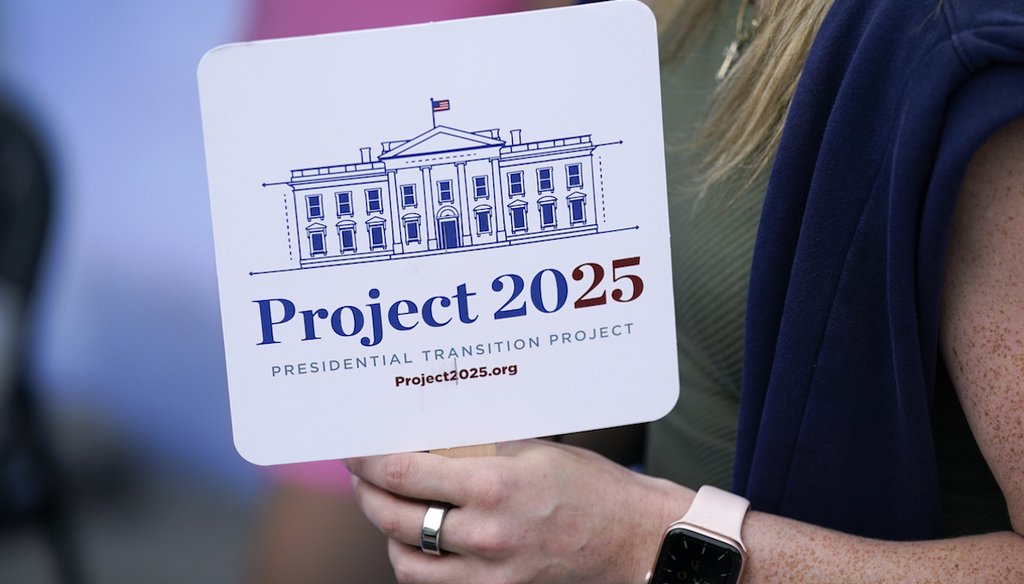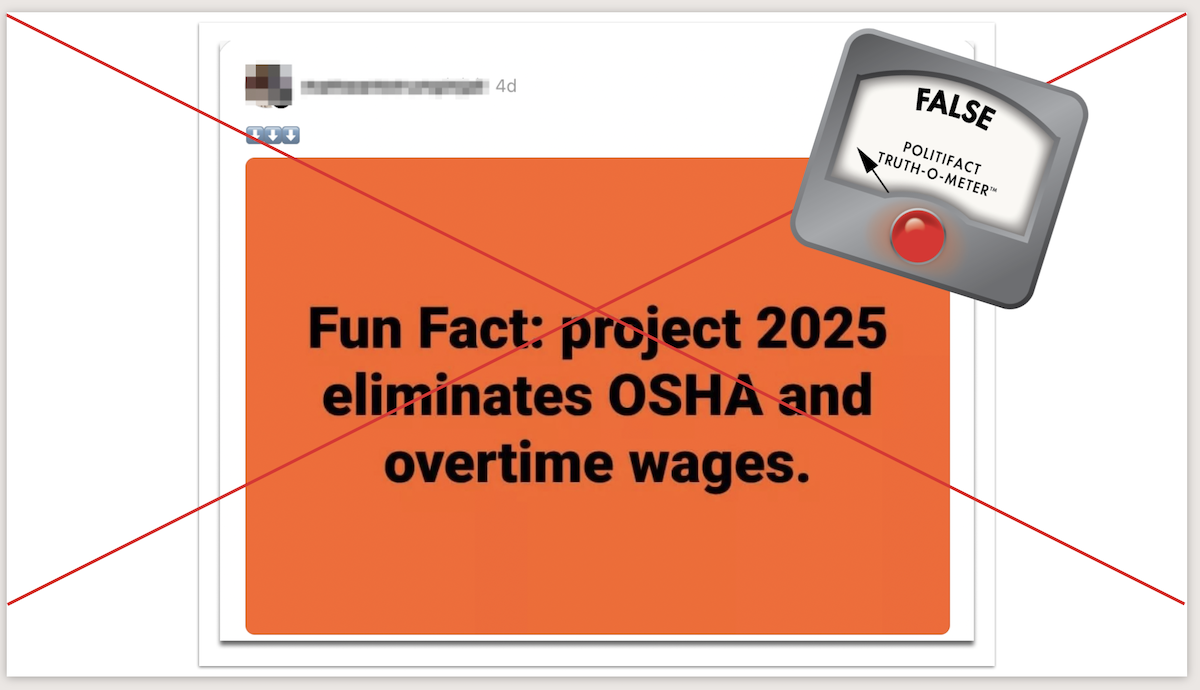Stand up for the facts!
Our only agenda is to publish the truth so you can be an informed participant in democracy.
We need your help.
I would like to contribute

A Project 2025 fan is seen Aug. 14, 2023, in the group's tent at the Iowa State Fair in Des Moines, Iowa. (AP)
Project 2025 doesn’t call for eliminating OSHA or overtime, just for changes
If Your Time is short
-
Project 2025, a conservative agenda proposed by a coalition of more than 100 organizations, calls for making sweeping changes to the federal government under the next Republican president.
-
Contrary to social media claims, the policy plan does not call to eliminate the Occupational Safety and Health Administration or banning overtime wages.
-
The plan does call for changes to some OSHA regulations and to overtime rules. Some changes, if enacted, could result in some people losing overtime protections.
President Joe Biden and Democrats have launched a campaign blitz against Project 2025, tying the proposed conservative agenda to former President Donald Trump, who has tried to distance himself from the plan.
Others social media users have also attacked the plan and how they say it will affect Americans.
"Fun Fact: Project 2025 eliminates OSHA (the Occupational Safety and Health Administration) and overtime wages," a July 7 Threads post said.
Other social media posts shared one or both of the OSHA and overtime claims.
The Threads post was flagged as part of Meta’s efforts to combat false news and misinformation on its News Feed. (Read more about our partnership with Meta, which owns Threads, Facebook and Instagram.)
Project 2025 is a policy platform drafted by more than 100 conservative organizations and led by the Heritage Foundation, a conservative, Washington, D.C.-based think tank. The project is referred to as a "2025 Presidential Transition Project" and outlines a sweeping policy agenda; efforts to hire and train conservatives to execute it; and a plan to create a 180-day playbook for the next administration.
A Project 2025 spokesperson told PolitiFact in an email that the claims about eliminating OSHA and overtime wages are "completely false".
The spokesperson said the plan calls for greater flexibility in overtime pay so that workers, particularly those with families, can have more flexibility in their hours without receiving smaller paychecks, adding that it also calls for greater clarity in overtime rules so that more employers will offer fringe benefits to hourly workers.
Labor law experts also told PolitiFact that the Project 2025 plan doesn’t eliminate OSHA or overtime, but said some workers could lose overtime protections if the plan’s proposals are enacted.
(Threads screenshot)
What does Project 2025 say about OSHA?
OSHA is a U.S. Labor Department division that sets and enforces safe and healthy working conditions for U.S. employers.
Jenn Round, the director of Beyond the Bill, a program that advocates for labor standards enforcement, at Rutgers University’s Workplace Justice Lab, said, "I don't see anything in the plan that calls for the elimination of OSHA. There are provisions that are meant to ‘rein in’ OSHA, as the general policy states."
Edwin Feulner, the Heritage Foundation’s founder, writes in the policy agenda’s afterword about the importance of having conservative political appointees in agencies, saying they "must serve to ‘watch the watchers’ in the departments and agencies they oversee."
"They must rein in agencies such as the Occupational Safety and Health Administration, which the Biden Administration weaponized to attempt to force COVID-19 vaccine mandates on 84 million Americans through their workplaces," the document states. Feulner also singled out agencies such as the Internal Revenue Service and the Environmental Protection Agency.
Chapter 18 of the plan, which focuses on the Labor Department and related agencies, refers to OSHA in this way:
-
It proposes that Congress and the Labor Department should "exempt small business, first-time, non-willful violators from fines issued by the Occupational Health and Safety Administration."
-
The Labor Department should clarify that a home office is not subject to OSHA regulations.
-
Labor agencies should use their discretion under the law to "exempt small entities from regulations where possible."
-
Focus health and safety inspections on egregious offenders.
But nowhere does the plan call for eliminating OSHA.
What does it say about overtime pay?
The plan also doesn’t call for eliminating overtime wages outright, as the Threads post claimed.
But some of the plan’s overtime proposals could result in some workers losing overtime protections, experts told PolitiFact.
Among overtime proposals are for the Labor Department to maintain an overtime threshold "that does not punish businesses in lower-cost regions (e.g., the southeast United States)."
The overtime threshold is the amount of money executive, administrative or professional employees need to make for an employer to exempt them from overtime pay under the Fair Labor Standards Act.
The Trump-era threshold is high enough to cover most line workers in lower-cost regions, the plan said.
In 2019, Trump’s Labor Department finalized a rule that expanded overtime pay eligibility to most salaried workers earning less than about $35,568, which it said made about 1.3 million more workers eligible for overtime pay.
The Biden administration raised that threshold to $43,888 beginning July 1, and that will rise to $58,656 on Jan. 1, 2025. That would grant overtime eligibility to about 4 million workers, the Labor Department said. The Economic Policy Institute, a left-leaning Washington, D.C.-based think tank, put that number at 4.3 million workers.
It’s unclear how many workers Project 2025’s proposal to return to the Trump-era overtime threshold in some parts of the country would affect, but presumably some would lose the right to overtime wages.
"This would ostensibly create different overtime thresholds for different parts of the country," Round said. "It's hard to say how many of these workers would lose those protections without more specifics on what is considered a lower-cost region."
Other overtime proposals in the 2025 plan include:
-
Congress should enact the Working Families Flexibility Act, which would let private sector workers choose to accumulate paid time off instead of overtime pay.
-
Congress should amend the Fair Labor Standards Act to require employers to pay workers overtime for working on the Sabbath (Sunday in most cases).
-
Congress should clarify that remote workers can get overtime only if they exceed 10 hours of work in a specific day and their total hours for the week exceed 40.
-
Congress should give employers and employees flexibility to calculate the overtime period over a number of weeks, so a worker could choose to work more hours in one week and fewer the next, rather than get overtime pay.
-
Congress should clarify that the "regular rate" for overtime pay is based on the salary paid rather than all benefits provided.
Labor law experts told PolitiFact that employers could abuse some proposals framed as giving workers a choice.
Cornell University senior lecturer Kate Bronfenbrenner, director of Labor Education Research at its School of Industrial and Labor Relations, said that because most workers lack union protections, the Project 2025 proposal "gives the employer enormous coercive power to force workers to take time off" instead of overtime pay.
Round said that some employers could then "never allow workers to use their banked PTO, effectively eliminating overtime pay."
She added that redefining the overtime period to several weeks, as Project 2025 proposes, "would significantly undermine overtime protections."
"The policy effectively dismantles the standard workweek," she said.
Our ruling
A Threads post claimed Project 2025 would eliminate OSHA and overtime wages if enacted. The plan does not outright call to eliminate either of those things, but proposes changes that would affect them.
Project 2025 calls for lessening restrictions under OSHA and flagged it as one of several federal agencies that need to be reined in, citing Biden’s attempt to use it to enforce COVID-19 vaccine mandates.
The plan also proposes changing overtime rules, including lowering the threshold for employers to exempt salaried employees in some parts of the country and letting employees choose time off instead of overtime pay. Some experts said lowering the threshold could decrease the number of people eligible for overtime and that some employers could exploit changed overtime rules.
But Project 2025’s proposals would eliminate neither OSHA nor overtime wages. The claim is False.
RELATED:
No, Project 2025 didn’t call for ‘period passports’ for women; claim originated as satire
No, Project 2025 doesn’t mention eliminating Social Security and disability benefits
Our Sources
Threads post, July 7, 2024 (archived)
Emailed statement, Project 2025 spokesperson, July 11, 2024
Email interview, Jenn Round, director of Beyond the Bill at Rutgers University’s Workplace Justice Lab, July 11, 2024
Phone interview, Kate Bronfenbrenner, senior lecturer and director of Labor Education Research at Cornell University’s School of Industrial and Labor Relations.
Email interview, Jessica Garrick, Denver University sociology professor who studies labor policies, July 11, 2024
Donald Trump, Truth Social post, July 5, 2024
U.S. Department of Labor, Biden-Harris administration finalizes rule to increase compensation thresholds for overtime eligibility, expanding protections for millions of workers, April 23, 2024
U.S. Department of Labor, Defining and Delimiting the Exemptions for Executive, Administrative, Professional, Outside Sales, and Computer Employees, April 26, 2024
Economic Policy Institute, Explaining the Department of Labor’s new overtime rule that will benefit 4.3 million workers, April 23, 2024
U.S. Department of Labor, U.S. Department of Labor Issues Final Overtime Rule, Sept. 24, 2019
Project 2025, 2025 Mandate for Leadership, accessed July 10, 2024
Project 2025, Chapter 18, Department of Labor and Related Agencies, accessed July 10, 2024
Project 2025, Afterword, accessed July 10, 2024
Project 2025, 180-Day Playbook, accessed July 11, 2024
Project 2025, Presidential Personnel Database, accessed July 11, 2024
Project 2025, Presidential Administration Academy, accessed July 11, 2024
Congress, S.247 - Working Families Flexibility Act of 2021, Feb. 4, 2022
Browse the Truth-O-Meter
More by Jeff Cercone
Project 2025 doesn’t call for eliminating OSHA or overtime, just for changes
Support independent fact-checking.
Become a member!
In a world of wild talk and fake news, help us stand up for the facts.
































